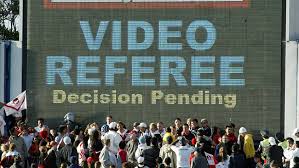By Andrew Warshaw
January 8 – The 2020 European Championship finals, taking place in 13 venues across the Continent, looks set to become the first major tournament to embrace video replays, arguably the most ground-breaking law change in the history of the game.
The International Football Association Board, the game’s law-making body comprising FIFA and the four British associations, decided at their preliminary business meeting on Thursday to recommend to their main session in two months’ time that trials could begin with a view to video technology becoming law.
Contentious goalscoring decisions, penalties, red card offences and mistaken identity are the four key areas that IFAB delegates have agreed could be assisted by video replays.
Currently goal-line technology is as far as the rules go but the idea of extending that to other areas of the game, resisted hitherto and put off by the traditional conservative IFAB last year, has now moved a vital step closer.
The Dutch FA have already asked to be given permission to test the technology in live games, something the sport’s custodians were reluctant to endorse last spring but an idea which has now moved on apace, thanks in part to the input of two new panels of experts.
Any rule change needs six out of eight votes. FIFA controls half of them and while many fans support football adopting a practise used for years in other sports, football’s world governing body has in the past taken the view it is far too radical to approve anything other than goal-line technology which itself took decades to come into force.
But just as FIFA’s governance reform process picks up steam, so attitudes have softened towards bringing the game itself into the modern age.
Jonathan Ford, the chief executive of the Football Association of Wales, who chaired the meeting on Thursday and will also chair the AGM in Cardiff in early March, said: “We are making the strongest possible recommendation to approve this experiment when we meet again.
“But there are many different perameters in terms of how the referee gets his information. Is there a man in the van? Does he view a monitor? There are still some sceptics and the only way we can have a full debate is with more information available to us. Full and extensive experimentation is needed so we can make a lasting decision once and for all.”
Stewart Regan, the chief executive of the Scottish FA added: “There are many details to be finalised, and we think the experiments will last between two and three seasons.”
Which means that if the whole things comes to fruition, Euro 2020 rather than the World Cup in Russia would be the first major international tournament to embrace the innovation, somewhat ironic given that the tournament’s unique format was the brainchild of UEFA president Michel Platini, who has long been resistant to any kind of scientific aids to help referees but who will not be around if his eight-year ban sticks.
David Elleray, the former Premier League referee who sits on IFAB’s technical sub committee, said: “The main objective is to try and eliminate clear errors by the referee. You will never eliminate all errors from the game, but this is a major step forward in reducing those errors.”
The March 4-6 date of this year’s main IFAB session is interesting given that approving experimentation of video replays could now co-incidenally end up being one of the first tasks of the new FIFA president since the election to replace Sepp Blatter comes only a week before.
“Much could depend on who the new president is,” one IFAB source told Insideworldfootball . “But there is certainly a feeling that there is already a fresh approach.”
Contact the writer of this story at moc.l1745177972labto1745177972ofdlr1745177972owedi1745177972sni@n1745177972osloh1745177972cin.l1745177972uap1745177972

